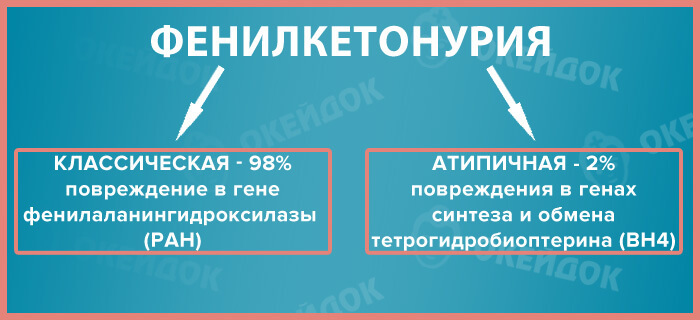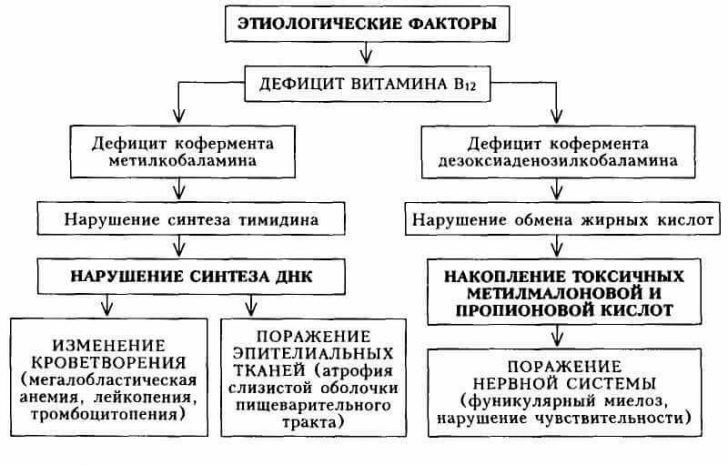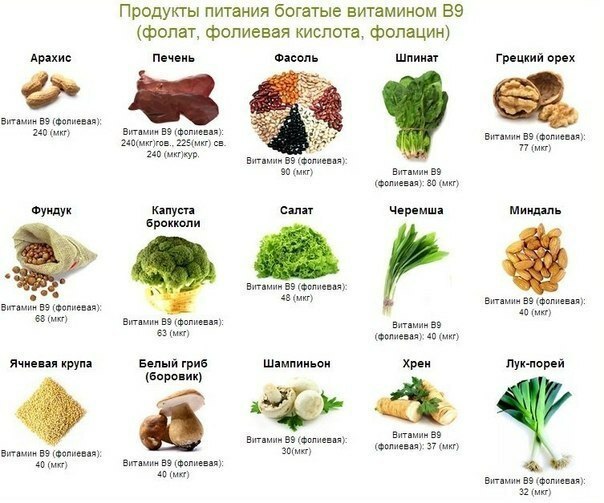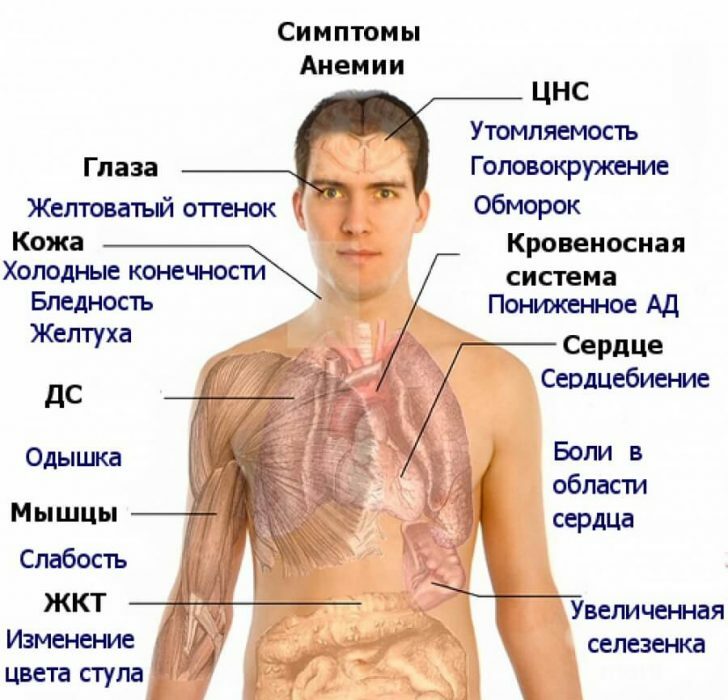Phenylketonuria: what kind of disease is it and how does it manifest itself

Phenylketonuria is a congenital pathology that is thought to be genetically determined and is characterized by a violation of the hydroxylation of phenylalanine, the accumulation of amino acid and its metabolites in physiological fluids and tissues.With prolonged flow and complete absence of treatment, the central nervous system is affected. This disease occurs infrequently - 10 000 newborn babies are born only 1 toddler with phenylketonuria .It is noteworthy that in the newborn age the disease does not have any bright manifestations, but when phenylalanine enters the body of a child with food, a manifestation of pathology takes place.Usually this happens in the first half of the child's life( just the time of feeding), further phenylketonuria leads to severe disabilities in the development of the baby.
Table of contents: Causes of phenylketonuria How phenylketonuria manifests Diagnostic measures Treatment of phenylketonuriaCauses of phenylketonuria
According to the classification in medicine, the disease under consideration is autosomal recessive, which means that the child must inherit one for the development of clinical signs of phenylketonuriaDefective copy of the gene from both parents, which, in turn, are carriers of the mutant gene.
Most often, the mutation of the gene encoding the phenylalanine-4-hydroxylase enzyme leads to the development of the disease under consideration. This will be classical type 1 phenylketonuria, which accounts for 98% of all diagnoses of the disease.If treatment is absent, the pathology leads to deep mental retardation.
In addition to the classical form of the disease under consideration, there is still an atypical one - it proceeds almost the same way with the previous one, but it can not be corrected even by dietotherapy.

Note: , the risk of having a child with phenylketonuria rises sharply in the case of closely related marriages.
As manifested phenylketonuria

Neonates with this disease do not have any specific clinical manifestations, and only at the age of 2-6 months the child begins manifesting the disease.As soon as a protein of milk( breast, or substitutes for artificial feeding) enters the baby's organism, the first non-specific signs of phenylketonuria appear - lethargy, unmotivated anxiety, hyperexcitability, constant regurgitation, muscular dystonia, convulsive syndrome.One of the earliest signs of the disease under consideration is persistent vomiting, but it is often perceived as a clinical manifestation of pyloric stenosis.
By the age of six months, the child is clearly traced backward in psychomotor development - for example, the baby becomes less active, at some point ceases to recognize the people around him( even the closest), no attempts to sit or stand on legs.During this period, the composition of urine and sweat becomes abnormal, which causes a characteristic smell - "mouse", the fragrance of mold.Often, parents note the appearance on the skin of a baby active peeling, eczema and dermatitis.
If children diagnosed with phenylketonuria do not undergo treatment, then they will be diagnosed with microcephaly, only after one and a half years teeth will begin to erupt, the delay in speech development will be clearly traced, and by 3, a maximum of 4 years, deep mental retardation and complete absence of speech(Except for some vague sounds).
Children with phenylketonuria are characterized by a dysplastic physique, they often have congenital heart defects, there may be vegetative dysfunctions and chronic constipation. For such a sick child, the following will be characteristic:
- tremor of the upper limbs;
- hyperkinesis;
- pose "tailor"( the lower and upper limbs are strongly bent in the joints);
- a shining gait.
All of the above clinical manifestations of phenylketonuria relate to the classical form of the disease.With atypical forms of the pathology in question, the increased excitability, tendon hyperreflexia, severe degree of mental retardation will be characteristic.The disease inevitably progresses and by the age of 2-3 the child dies.
Diagnostic activities
 Diagnostics of phenylketonuria is included in the neonatal screening program, which is carried out by all, without exception, the newborn .This test is carried out for 3-5 days of life of the baby and on the 7th day of life in the event that the baby was born prematurely.The study is carried out by sampling capillary blood, when a newborn's hyperphenylalanemia is detected, it is sent to the pediatric genetics for a re-examination.
Diagnostics of phenylketonuria is included in the neonatal screening program, which is carried out by all, without exception, the newborn .This test is carried out for 3-5 days of life of the baby and on the 7th day of life in the event that the baby was born prematurely.The study is carried out by sampling capillary blood, when a newborn's hyperphenylalanemia is detected, it is sent to the pediatric genetics for a re-examination.
To diagnose phenylketonuria has been confirmed, the doctors conduct the following studies:
- determine the activity of hepatic enzymes;
- elucidates the concentration of tyrosine and phenylalanine in the child's blood;
- perform biochemical analysis of urine;
- is assigned to an MRI of the brain;
- conduct EEG.
Since the clinical manifestations of the disease in question are nonspecific, doctors necessarily differentiate phenylketonuria with intrauterine infections, intracranial birth trauma of newborns and metabolic disorders of amino acids.
Note: genetic defect in phenylketonuria can be diagnosed by doctors during pregnancy.To do this, invasive prenatal diagnostics are carried out - chorobiopsia, cordocentesis, amniocentesis.
Treatment of phenylketonuria
 Unfortunately, there is no specific and effective treatment for the disease in question.The fundamental factor in therapy is adherence to a strict diet, which limits the intake of protein in the body of the patient .
Unfortunately, there is no specific and effective treatment for the disease in question.The fundamental factor in therapy is adherence to a strict diet, which limits the intake of protein in the body of the patient .
Special formulas for feeding have been developed for babies, similar mixtures are also available for older children.The basis of the diet - low-protein foods, which include fruits, vegetables and amino acid mixtures.Expansion of the diet can be tolerated only after reaching the age of eighteen - the body for this period increases tolerance to phenylalanine.
In addition to diet therapy, for children with phenylketonuria, doctors can make the following prescriptions: :
- mineral compounds;
- nootropics;
- B vitamins;
- anticonvulsants.
In complex therapy should be present therapeutic exercise, acupuncture and massage.
Note: with atypical form of phenylketonuria, which can not be corrected by diet therapy, doctors prescribe hepatoprotectors, anticonvulsants.Such treatment will help to alleviate the condition of the child.
Children with a considered disease are constantly on the account of a pediatrician, they will definitely need the help of a speech therapist and a defectologist.Specialists should conduct continuous monitoring of the neuropsychological status, control the level of phenylalanine in the blood and take measurements of the electroencephalogram.
The possibility of screening for phenylketonuria in the neonatal period allows to organize early diet therapy, which prevents the development of cerebral pathological damage and impaired liver function.If diet therapy was prescribed on time and fully respected, then the development forecast of the baby is quite favorable.If the correction of nutrition is not carried out, then the forecasts for the disease are extremely unfavorable, up to a lethal outcome in early childhood.
Phenylketonuria is a complex disease, requiring constant monitoring by specialists and the willingness of parents to monitor the nutrition and treatment of the child.
Tsygankova Yana Aleksandrovna, medical reviewer, therapeutist of the highest qualification category



